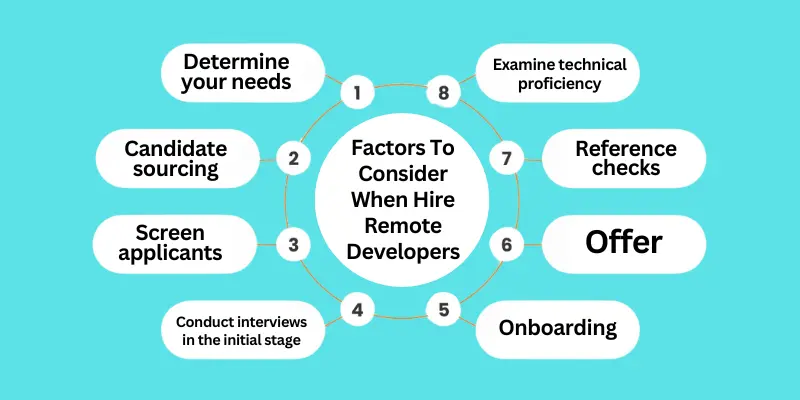Whether your organization is just getting underway or an established one, having a team of talented developers is vital for its success.
Remote work has increased in the past few years, specifically after the pandemic. It allows companies to interact with top talents worldwide without physical location restrictions. Its increasing adoption is evidence of its cost-savings and flexibility benefits for employers.
Hiring remote developers can present many challenges to businesses just starting their journey into remote employment, particularly those just beginning. Finding candidates with the necessary skills and mindset may prove more challenging when conducting assessments and interviews remotely.
Hiring remote developers is nothing new; studies predict that approximately 73% of teams employ at least some remote employees.
Location can become an obstacle when hiring the ideal talent, forcing you to rely on local resources as much as possible.
However, hiring remote programmers changes everything for the better.
Harvard Business Review's research study disproved the popular misconception that remote programmers were less productive than internal developers. Instead, it found that employees working remotely for software development tended to be happier and more effective than those operating under traditional arrangements.
What is remote development?
Remote developers develop computer software or programs from their comfort zone, such as at home or in coffee shops. Instead of visiting the office every day using a computer, they utilize it to work from home and communicate with their colleagues. Remote developers write, test, and update code to ensure the software functions properly. They also design and coordinate projects with their team. Moreover, remote work renders flexibility and freedom regarding their time, so they can effectively manage their work with other aspects of their lives.
What Are the Benefits of Hiring a Remote Developer?

Round-the-clock
Your remote development team is located in a different time zone. This means that some part of your team is constantly being worked on.
Working with a team in a different time zone presents a few obstacles. However, a well-trained and knowledgeable team will overcome these obstacles. In a remote development setting, the developers are less distracted and more focused, which reduces the time to market.
Time zones can be an obstacle that only a skilled team with a proper process can overcome.
More engagement
Based on a two-year study conducted by Stanford University on hiring dedicated remote developers, they make up about a third of the average.
-
-
13.5 percent more productive than office counterparts.
-
9 percent more enthusiastic about their work.
-
50 percent less likely to leave.
-
With today's communication capabilities, remote developers are more engaged and connected than their office counterparts.
Productive work environment
In a remote working environment, developers can work more freely and with less stress and distractions caused by a loud office culture.
The plan's development portion is developed remotely, which allows an internal team to concentrate more on core projects.
Boosted development capabilities
A remote working environment enables companies to access talented developers for competitive pay. Compared to an expensive internal team, you will have better development capabilities for an affordable cost.
According to a GWA study, businesses could save an average of $5,500 per year on remote workers. Research reports stated that 77 percent of emote employees report greater productivity and 52% are less likely to miss work.
Wider Market Reach
When you work with a remote software development team, your company has entered the market. Your remote team acts as brand ambassadors who can market your business to prospective customers.
Factors To Consider When Hire Remote Developers

Determine your needs
Discuss the knowledge, skills, and experience required of remote developers. Learn about your project's technology, language, and specific requirements to ensure that your research is targeted.
Candidate sourcing
Locate possible candidates using online job portals and professional networking websites, including LinkedIn, GitHub, and job boards.
Screen applicants
Examine resumes and portfolios to narrow down candidates who satisfy the needs of software developers with relevant work experience and technical abilities and track performance in a remote workplace.
Conduct interviews in the initial stage
Set up virtual interviews to test the candidates' communication skills, aptitude, ability to adapt to culture, and motivation. Utilizing video conferencing tools like Zoom or Skype. Lastly, focus on conducting face-to-face interviews to assess the suitability of candidates for the position.
Examine technical proficiency
Conduct coding tests or assignments to determine candidates' technical capabilities and problem-solving skills. This ensures you possess the ability to excel in your job.
Reference checks
Refer to references supplied by candidates to confirm their experience, skills, and performance. This will verify their credentials and prove their suitability for the position.
Offer
Send a formal invitation to the chosen applicant, specifying employment conditions such as benefits, compensation, and a joining date. Be honest and flexible in discussions to reach a mutually beneficial agreement.
Onboarding
Give comprehensive onboarding material and tools to assist new employees become part of the company's culture and team. Plan a virtual orientation and designate an instructor to assist the company process.
Also Read: Where and How To Hire Software Developers for Remote Work on US Projects in 2024
Hire Remote Software Developers: Steps To Consider
Step1: Write a Job Description for Remote Developers
Writing a solid job advertisement is crucial to drawing the most qualified talent for your team. Your writing style should align with the company's values and accurately reflect what you're seeking in prospective candidates.
You must focus on three essential elements: the job title, description, and the developer's roles/responsibilities.
Job Title
Similar to opening your email and scanning the messages quickly subjects, job seekers focus on the job title.
Professional titles such as Python Developer, Full-Stack Angular Developer, and DevOps Engineer are great ways to entice them.
Job Description
This paragraph must clearly define the developer's role. While incorporating personality and humor can be fun, it is best to avoid the latter. You must focus on providing the most essential information to draw prospective candidates.
The most important points mentioned below:-
-
-
Your Company/Project Name,
-
The level of experience indicates seniority, which can help determine suitable candidates.
-
Role e.g., Full-Stack Role - e.g., Full-Stack Developer,
-
Core Tech Skills Core Tech Skills, e.g., Android and React.
-
Responsibilities and Skills
-
-
This section offers a brief overview of the daily tasks and essential skills required of a remote developer.
-
Define what the developer is going to do. Include the action verbs to make sentences more exciting and interesting.
-
Instead of long paragraphs, choose short lists of the five major duties.
-
Also, consider listing the job's must-have and desired competencies to ensure you don't limit candidates.
-
Step 2: Define the Target Region
-
-
One of the most important aspects of learning how to find remote developers without spending a lot of money is determining the areas that coincide with the budget.
-
Beyond the cost, the price-quality ratio is critical for finding skilled remote workers. Numerous companies are now outsourcing their work in Asia, Latin America, Central and Eastern Europe.
-
To make a well-informed decision, look at the differences between timing zones, the developers' pool, and the rates available in different regions.
-
Step 3: Search for Candidates
After you've created an extensive job description that includes your expectations, consider how you can effectively share the information with potential applicants.
Various options are available to work with remote developers. For example, Utilize the advantages of social media sites such as LinkedIn, Twitter, and Facebook to meet potential candidates. Join relevant communities and groups, share job announcements, and interact with professionals from your field to increase your reach.
Post job opportunities on remote job portals and freelancing platforms like Upwork, Freelancer, and Remote. co. These platforms have a vast collection of talented developers looking for remote work.
Think about collaborating with specialist technology recruiting services and IT staff augmentation. They have extensive networks and experts in sourcing, screening, and coordinating remote developers to meet your needs and your company's culture.
Step 4:Candidates Screening
After you've received the CVs and picked the top applicants for remote work, it's now time to evaluate their abilities through the interviewing procedure.
Develop a multi-step interviewing process to determine the communicative and technical abilities of the candidates.
We suggest beginning the interview process with an initial video chat. Skype, Zoom, and Google Meet are the most popular video interview applications. This will allow you to get a "feel" for the applicant and determine if they fit your requirements.
Soft Skills Interview
The soft skills test helps examine the candidate's personality, personal style, behavior, and values.
It mainly involves asking behavioral questions to determine whether the applicant has the necessary qualities required for remote developers, for instance:
-
-
Flexibility
-
Self-motivation
-
Good communication skills
-
Good time management
-
Collaboration between teams
-
Work-life balance
-
Technical Interview
The process involves testing the applicant's technical capabilities, which are also referred to as hard skills.
During the technical skills interview, ask about the candidate's previous projects, the roles they took on, the issues they encountered and resolved, and the solutions they devised to technical issues.
Technical interviews typically include live programming sessions to test the programmer's knowledge and experience.
Pair Programming Session
To observe candidates' performance, technical managers (such as an engineer from your own team) create a test-programming project and coordinate with the applicant. Popular tools such as Slack and GitHub can often be utilized for these programming sessions.
You can efficiently assess the potential candidate's abilities using pairing programming with various tools.
If you follow an extensive screening process, you can find a remote developer with both soft and technical skills suitable for your team.
Step 5:Final Decision
It is crucial to evaluate how a person handles the tasks assigned to them, how they respond to the assignment, communicate intermediate results and any issues, follow time frames, and then present the final result.
A test is an excellent example of goal-setting, which will reveal these characteristics.
Task Acceptance
While you look for the perfect remote developer, consider how they comprehend the task at hand.
A red flag for AA is when the expert doesn't inquire during the discussion but responds by saying, "I don't understand," half an hour later. If a developer does not seek clarification during goal-setting and cannot achieve the desired outcomes, it could indicate a lack of expertise, which could lead to issues regarding their work.
Positive signs are the moment a candidate is able to fully comprehend the job, ask thoughtful questions, and even suggest different ways to accomplish the task.
The ideal scenario is one in which a developer confidently states, "Everything is clear," and gives results quickly, even though these kinds of situations are not common.
Informing About Progress and Obstacles
Understanding how remote software developers respond to issues when working on the assigned task is crucial.
Three reactions that you need to be wary about are:
-
-
Engineers stopped working on the project and are waiting for the next conference to resolve the issue, thereby delaying the project's timeline.
-
An engineer outside the group of developers tries to solve issues independently without focusing on the initial task. In the end, much time is lost, and all work must be done again.
-
An engineer swarms the team with a plethora of questions. In the end, it's not a huge problem; however, it could cause issues with management and inefficiencies.
-
In the ideal situation, the developer must anticipate possible obstacles and inform them before they can make the work process an absolute nightmare.
Reporting the Results Obtained
Pay attention to the way the developer produces the results of their work that cover:-
-
-
The specialist finishes the job but is silent until the client requests an update.
-
A specialist will finish and complete the job, but you will discover the issue only when you begin to examine it.
-
A specialist finishes the job and then schedules a quick phone call to show the results and highlight minor problems.
-
The third option is the best since it demonstrates active and efficient communication.
-
Ultimately, the most critical aspect of these test activities is determining how the candidate interacts with an entire team rather than the code quality.
Job Offer and Onboarding
Review the contract
Discuss the contract with your management and the legal department. If you're recruiting remote development directly via a designated company, you may want to sign the contract they've established.
Sign a Non-Disclosure Agreement (NDA)
To safeguard your project from misuse, theft, or unauthorized publicity, make sure that the person developing it is able to sign an NDA prior to starting work.
Establish effective communication channels
Choose the best communication platform for your business. This could include Slack, Microsoft Teams, or other alternatives.
Review the Meeting Dates and Schedule
-
-
Please take a quick look at the dates of meetings and other key milestones to ensure that everything is going smoothly.
-
Assign in-house developers as a point of contact.
-
Define the person (if available) who will help with any issues and offer the needed guidance for the remote developer.
-
Smooth Onboarding Process
-
Ensure the new team member is fully informed about this project's objectives and the team dynamic. Give them all the necessary tools and information to integrate seamlessly.
Also Read: Hire iOS App Developers on a WFH Remote Basis For a Cost-effective Rate
Challenges For Hiring Remote Developers

Remote hiring comes with the same set of difficulties. Some of the most significant problems are:
Communication barriers
Remote work can result in miscommunications or misunderstandings due to the absence of face-to-face interactions. Language barriers and the use of digital communication tools can create the issue.
Infrastructure for technical purposes
Before hiring a software developer, ensure that they have the proper tools, technology, and infrastructure to complete their work. This requires an efficient, stable connection and the right software and hardware licenses. However, finding remote developers can be challenging.
Time zone differences
Coordination of work across various time zones can create problems with logistics, especially in meetings, collaborative work sessions, or discussions of urgent problems.
Monitoring and accountability
Without a physical monitor, tracking the productivity and performance of remote developers could be difficult. Setting specific expectations, milestones, and performance indicators ensures accountability.
Training and onboarding
Remote developers must be enrolled with proper care, planning, and coordination to ensure they have the right resources in terms of training, support, and assistance to join the team and start contributing efficiently.
Security issues
Remote work poses additional cybersecurity dangers, enhancing the risk of unauthorized access, data theft, and compliance issues. Therefore, it is essential to adopt appropriate security protocols and measures to minimize the threat.
Work-Life balance
Remote developers often struggle to achieve an appropriate balance between work and life, particularly when they work across time zones and have flexible work schedules. Establishing boundaries, setting clearly defined expectations, and promoting self-care habits can help resolve this problem.
In the end, solving these issues requires a proactive approach to control, clear and consistent communication, and a commitment to assist remote engineers in their duties. When businesses recognize and address these issues, they can ensure the maximum success of their remote recruiting efforts and develop highly-performing remote teams.
Conclusion
Hiring dedicated remote developers with the appropriate expertise and experience can be intimidating. However, joining hands with a trusted company along with a strong team of highly qualified engineers can ease the process and help ensure that you get the best solution for your company's requirements.
In the last several years, JP Loft has become known for its highly efficient remote teams. With years of expertise in software development, we also assist businesses and industries in hiring remote developers.
If you are seeking to hire remote developer composed of highly talented and diverse people who double as top-quality developers, project managers, and their family members.













Share this blog